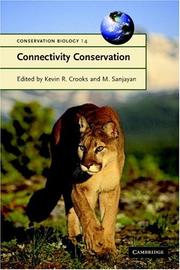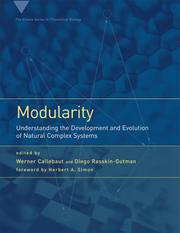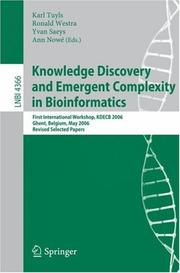| Listing 1 - 8 of 8 |
Sort by
|
Book
ISBN: 9780443192388 0443192383 9780443192371 0443192375 Year: 2023 Publisher: Amsterdam, Netherlands : Elsevier Inc.,
Abstract | Keywords | Export | Availability | Bookmark
 Loading...
Loading...Choose an application
- Reference Manager
- EndNote
- RefWorks (Direct export to RefWorks)
Complexity and Complex Ecological Systems covers the basic aspects of analysis, synthesis and optimization of ecological systems. The book focuses on the study of environmental systems, presenting how organisms behave and live with each other in unique physical environs. It covers ecology-related topics, such as biological diversity in fluid systems, living complexity behavior, and organismic changes in unique environments, as well as other ecological problems such as biological organization, life with each other, energy degradation, gradient reduction, organisms' adaptation, population dynamics, spatial patterns, ecological integrity, sustainability and environmental strategies. This complexity-oriented book complements Sieniutycz' recently published books Complexity and Complex Thermo-Economic Systems and Complexity and Complex Chemo-Electric Systems. Provides coherent treatment of ecosystem design problems (modeling, analysis, synthesis and optimization) Offers a synthesizing presentation of dynamical properties of ecosystems Contains original graphs illustrating a dynamic programming approach to ecosystems.
Biocomplexity. --- Ecology --- Mathematical models. --- Biological complexity --- Complexity, Biological --- Biology --- Biodiversity
Book
ISBN: 1108900011 1108903282 1108903703 1316514129 Year: 2023 Publisher: Cambridge : Cambridge University Press,
Abstract | Keywords | Export | Availability | Bookmark
 Loading...
Loading...Choose an application
- Reference Manager
- EndNote
- RefWorks (Direct export to RefWorks)
Complexity has received substantial attention from scientists and philosophers alike. There are numerous, often conflicting, accounts of how complexity should be defined and how it should be measured. Much less attention has been paid to the epistemic implications of complexity, especially in Ecology. How does the complex nature of ecological systems affect ecologists' ability to study them? This Element argues that ecological systems are complex in a rather special way: they are causally heterogeneous. Not only are they made up of many interacting parts, but their behaviour is variable across space or time. Causal heterogeneity is responsible for many of the epistemic difficulties that ecologists face, especially when making generalisations and predictions. Luckily, ecologists have the tools to overcome these difficulties, though these tools have historically been considered suspect by philosophers of science. The author presents an updated philosophical account with an optimistic outlook of the methods and status of ecological research.
Ecology --- Biocomplexity. --- Philosophy. --- Biological complexity --- Complexity, Biological --- Biology --- Biodiversity --- Ecophilosophy --- Complexity (Philosophy)
Book
ISBN: 0199330360 0199330352 9780199330355 9780199330348 0199330344 Year: 2014 Publisher: New York, New York : Oxford University Press,
Abstract | Keywords | Export | Availability | Bookmark
 Loading...
Loading...Choose an application
- Reference Manager
- EndNote
- RefWorks (Direct export to RefWorks)
Living systems exhibit a fundamental contradiction: they are highly stable and reliable, yet they have the capacity to adapt to changing environmental conditions. This paradoxical behavior arises from the complexity of life--a high degree of order and cooperation that emerges from relatively simple interactions among cellular components. The Complexity Paradox proposes inventive, interdisciplinary approaches to maintaining health and managing and preventing disease by considering the totality of human biology, from the cellular level on up to entire populations of individuals. From the perspec
Human biology --- Medicine --- Complexity (Philosophy) --- Biocomplexity. --- Biology --- Physical anthropology --- Biological complexity --- Complexity, Biological --- Biodiversity --- Philosophy --- Emergence (Philosophy) --- Health Workforce --- Philosophy.
Book
ISBN: 9780511762994 9780521429641 9780521728775 9780511776441 9780511774928 0511774923 0511776446 9780511773860 0511773862 0521429641 0521728770 0511762992 9786612657955 6612657952 1107205816 9781107205819 0511775687 9780511775680 0511772793 9780511772795 128265795X Year: 2010 Publisher: Cambridge : Cambridge University Press,
Abstract | Keywords | Export | Availability | Bookmark
 Loading...
Loading...Choose an application
- Reference Manager
- EndNote
- RefWorks (Direct export to RefWorks)
Natural selection is more than the survival of the fittest: it is a force engendering higher biological complexity. Presenting a new explanation for the tendency of life to become more complex through evolution, this book offers an introduction to the key debates in evolutionary theory, including the role of genes and sex in evolution, the adaptive reasons for senescence and death and the origin of neural information. The author argues that biological complexity increased through the process of 'modularity transfer': modular phenotypes (proteins, somatic cells, learned behaviours) evolved into new modular information carriers (regulatory proteins, neural cells, words), giving rise to new information systems and higher levels of biological organisation. Modular Evolution makes sense of the unique place of humans in evolution, both as the pinnacle of biological complexity and inventors of non-biological evolution.
Evolution (Biology) --- Natural selection. --- Biocomplexity. --- Molecular evolution. --- Biochemical evolution --- Chemical evolution --- Evolution --- Life --- Molecular biology --- Biological complexity --- Complexity, Biological --- Biology --- Biodiversity --- Darwinism --- Selection, Natural --- Genetics --- Variation (Biology) --- Biological invasions --- Heredity --- Animal evolution --- Animals --- Biological evolution --- Evolutionary biology --- Evolutionary science --- Origin of species --- Biological fitness --- Homoplasy --- Natural selection --- Phylogeny --- Origin

ISBN: 052167381X 0521857066 9780521673815 9780521673815 9780521857062 9780511754821 9780511349720 0511349726 0511348827 9780511348822 0511350600 9780511350603 0511754825 1107166497 1281085774 9786611085773 0511347871 0511568673 Year: 2006 Publisher: Cambridge : Cambridge University Press,
Abstract | Keywords | Export | Availability | Bookmark
 Loading...
Loading...Choose an application
- Reference Manager
- EndNote
- RefWorks (Direct export to RefWorks)
One of the biggest threats to the survival of many plant and animal species is the destruction or fragmentation of their natural habitats. The conservation of landscape connections, where animals, plants, and ecological processes can move freely from one habitat to another, is therefore an essential part of any new conservation or environmental protection plan. In practice, however, maintaining, creating, and protecting connectivity in our increasingly dissected world is a daunting challenge. This fascinating volume provides a synthesis on the current status and literature of connectivity conservation research and implementation. It shows the challenges involved in applying existing knowledge to real-world examples and highlights areas in need of further study. Containing contributions from leading scientists and practitioners, this topical and thought-provoking volume will be essential reading for graduate students, researchers, and practitioners working in conservation biology and natural resource management.
Biocomplexity. --- Biodiversity conservation. --- Biodiversity conservation --- 574.472 --- 502.7 --- Biological complexity --- Complexity, Biological --- Biology --- Biodiversity --- Biological diversity conservation --- Conservation of biodiversity --- Diversity conservation, Biological --- Gender mainstreaming in biodiversity conservation --- Maintenance of biological diversity --- Preservation of biological diversity --- Conservation of natural resources --- Ecosystem management --- Protection of animate nature. Wildlife conservation and protection --- Conservation --- 574.472 Biodiversity --- 502.7 Protection of animate nature. Wildlife conservation and protection --- Biocomplexity

ISBN: 0262269694 1423729919 9780262269698 9781423729914 0262033267 9780262033268 Year: 2005 Publisher: Cambridge, Mass. MIT Press
Abstract | Keywords | Export | Availability | Bookmark
 Loading...
Loading...Choose an application
- Reference Manager
- EndNote
- RefWorks (Direct export to RefWorks)
Experts from diverse fields, including artificial life, cognitive science, economics, developmental and evolutionary biology, and the arts, discuss modularity.Modularity--the attempt to understand systems as integrations of partially independent and interacting units--is today a dominant theme in the life sciences, cognitive science, and computer science. The concept goes back at least implicitly to the Scientific (or Copernican) Revolution, and can be found behind later theories of phrenology, physiology, and genetics; moreover, art, engineering, and mathematics rely on modular design principles. This collection broadens the scientific discussion of modularity by bringing together experts from a variety of disciplines, including artificial life, cognitive science, economics, evolutionary computation, developmental and evolutionary biology, linguistics, mathematics, morphology, paleontology, physics, theoretical chemistry, philosophy, and the arts.The contributors debate and compare the uses of modularity, discussing the different disciplinary contexts of "modular thinking" in general (including hierarchical organization, near-decomposability, quasi-independence, and recursion) or of more specialized concepts (including character complex, gene family, encapsulation, and mosaic evolution); what modules are, why and how they develop and evolve, and the implication for the research agenda in the disciplines involved; and how to bring about useful cross-disciplinary knowledge transfer on the topic. The book includes a foreword by the late Herbert A. Simon addressing the role of near-decomposability in understanding complex systems.
Evolution (Biology) --- Natural selection. --- Chaotic behavior in systems. --- Modularity (Psychology) --- Biocomplexity. --- Natural selection --- Chaotic behavior in systems --- Biocomplexity --- Biology --- Health & Biological Sciences --- Evolution --- Biological complexity --- Complexity, Biological --- Chaos in systems --- Chaos theory --- Chaotic motion in systems --- Darwinism --- Selection, Natural --- Faculty psychology --- Modules (Psychology) --- Animal evolution --- Animals --- Biological evolution --- Evolutionary biology --- Evolutionary science --- Origin of species --- Biodiversity --- Differentiable dynamical systems --- Dynamics --- Nonlinear theories --- System theory --- Genetics --- Variation (Biology) --- Biological invasions --- Heredity --- Human information processing --- Biological fitness --- Homoplasy --- Phylogeny --- BIOMEDICAL SCIENCES/Evolution --- BIOMEDICAL SCIENCES/General
Book
ISBN: 9781610912303 1610912306 9781597263542 1597263540 9781597268257 1597268267 Year: 2012 Publisher: Washington, DC : Island Press,
Abstract | Keywords | Export | Availability | Bookmark
 Loading...
Loading...Choose an application
- Reference Manager
- EndNote
- RefWorks (Direct export to RefWorks)
The need to understand and address large-scale environmental problems that are difficult to study in controlled environments—issues ranging from climate change to overfishing to invasive species—is driving the field of ecology in new and important directions. Observation and Ecology documents that transformation, exploring how scientists and researchers are expanding their methodological toolbox to incorporate an array of new and reexamined observational approaches—from traditional ecological knowledge to animal-borne sensors to genomic and remote-sensing technologies—to track, study, and understand current environmental problems and their implications. The authors paint a clear picture of what observational approaches to ecology are and where they fit in the context of ecological science. They consider the full range of observational abilities we have available to us and explore the challenges and practical difficulties of using a primarily observational approach to achieve scientific understanding. They also show how observations can be a bridge from ecological science to education, environmental policy, and resource management. Observations in Ecology can play a key role in understanding our changing planet and the consequences of human activities on ecological processes. This book will serve as an important resource for future scientists and conservation leaders who are seeking a more holistic and applicable approach to ecological science.
Pure sciences. Natural sciences (general) --- General ecology and biosociology --- Production management --- wetenschapsgeschiedenis --- ecologie --- duurzame ontwikkeling --- ecosystemen --- Sustainable development. --- History. --- Aquatic ecology . --- Ecosystems. --- Ecology . --- Sustainable Development. --- History of Science. --- Freshwater & Marine Ecology. --- Ecology. --- Annals --- Auxiliary sciences of history --- Development, Sustainable --- Ecologically sustainable development --- Economic development, Sustainable --- Economic sustainability --- ESD (Ecologically sustainable development) --- Smart growth --- Sustainable development --- Sustainable economic development --- Economic development --- Environmental aspects --- Balance of nature --- Biology --- Bionomics --- Ecological processes --- Ecological science --- Ecological sciences --- Environment --- Environmental biology --- Oecology --- Environmental sciences --- Population biology --- Biocenoses --- Biocoenoses --- Biogeoecology --- Biological communities --- Biomes --- Biotic community ecology --- Communities, Biotic --- Community ecology, Biotic --- Ecological communities --- Ecosystems --- Natural communities --- Ecology --- Aquatic biology --- Observation (Scientific method) --- Nature observation. --- Biocomplexity. --- Methodology. --- Research. --- Study and teaching. --- Biological complexity --- Complexity, Biological --- Biodiversity --- Observation, Nature --- Observing nature --- Nature study --- Outdoor recreation --- Ecological research --- Science --- Methodology

ISBN: 9783540710363 3540710361 9786610865604 1280865601 354071037X Year: 2007 Publisher: Berlin, Heidelberg : Springer-Verlag,
Abstract | Keywords | Export | Availability | Bookmark
 Loading...
Loading...Choose an application
- Reference Manager
- EndNote
- RefWorks (Direct export to RefWorks)
This book contains selected and revised papers of the International Symposium on Knowledge Discovery and Emergent Complexity in Bioinformatics (KDECB 2006), held at the University of Ghent, Belgium, May 10, 2006. In February 1943, the Austrian physicist Erwin Schrodi ¨ nger, one of the founding fathers of quantum mechanics, gave a series of lectures at Trinity College in Dublin titled “What Is Life? The Physical Aspect of the Living Cell and Mind. ” In these l- tures Schrodi ¨ nger stressed the fundamental differencesencountered between observing animate and inanimate matter, and advanced some, at the time, audacious hypotheses aboutthe nature andmolecularstructureof genes, some ten yearsbeforethe discoveries of Watson and Crick. Indeed, the rules of living matter, from the molecular level to the level of supraorganic ocking behavior, seem to violate the simple basic interactions found between fundamental particles as electrons and protons. It is as if the organic molecules in the cell ‘know’ that they are alive. Despite all external stochastic uct- tions and chaos, process and additive noise, this machinery has been ticking for at least 3. 8 billion years. Yet, we may safely assume that the laws that governphysicsalso steer these complex associations of synchronous and seemingly intentional dynamics in the cell.
Computational Biology --- Medical Informatics --- Data mining --- Bioinformatics --- Computational biology --- Biocomplexity --- Computational complexity --- Exploration de données (Informatique) --- Bio-informatique --- Complexité de calcul (Informatique) --- methods --- Congresses. --- Data processing --- Congrès --- Congresses --- Methods --- Publication Formats --- Information Science --- Investigative Techniques --- Biology --- Informatics --- Analytical, Diagnostic and Therapeutic Techniques and Equipment --- Biological Science Disciplines --- Publication Characteristics --- Natural Science Disciplines --- Disciplines and Occupations --- Computer Science --- Engineering & Applied Sciences --- Natural Sciences --- Physical Sciences --- Discipline, Natural Science --- Disciplines, Natural Science --- Natural Science --- Natural Science Discipline --- Physical Science --- Science, Natural --- Science, Physical --- Sciences, Natural --- Sciences, Physical --- Biologic Sciences --- Biological Science --- Science, Biological --- Sciences, Biological --- Biological Sciences --- Life Sciences --- Biologic Science --- Biological Science Discipline --- Discipline, Biological Science --- Disciplines, Biological Science --- Life Science --- Science Discipline, Biological --- Science Disciplines, Biological --- Science, Biologic --- Science, Life --- Sciences, Biologic --- Sciences, Life --- Investigative Technics --- Investigative Technic --- Investigative Technique --- Technic, Investigative --- Technics, Investigative --- Technique, Investigative --- Techniques, Investigative --- Information Sciences --- Science, Information --- Sciences, Information --- Computer Science, Medical --- Health Information Technology --- Informatics, Clinical --- Informatics, Medical --- Information Science, Medical --- Clinical Informatics --- Medical Computer Science --- Medical Information Science --- Health Information Technologies --- Information Technologies, Health --- Information Technology, Health --- Medical Computer Sciences --- Medical Information Sciences --- Science, Medical Computer --- Technologies, Health Information --- Technology, Health Information --- Biological complexity --- Complexity, Biological --- Bio-Informatics --- Biology, Computational --- Computational Molecular Biology --- Molecular Biology, Computational --- Bio Informatics --- Bio-Informatic --- Bioinformatic --- Biologies, Computational Molecular --- Biology, Computational Molecular --- Computational Molecular Biologies --- Molecular Biologies, Computational --- Methodological Studies --- Methodological Study --- Procedures --- Studies, Methodological --- Study, Methodological --- Method --- Procedure --- Algorithmic knowledge discovery --- Factual data analysis --- KDD (Information retrieval) --- Knowledge discovery in data --- Knowledge discovery in databases --- Mining, Data --- Life sciences. --- Mathematical statistics. --- Data mining. --- Information storage and retrieval. --- Artificial intelligence. --- Bioinformatics. --- Biochemistry. --- Life Sciences. --- Biochemistry, general. --- Data Mining and Knowledge Discovery. --- Artificial Intelligence (incl. Robotics). --- Information Storage and Retrieval. --- Computational Biology/Bioinformatics. --- Probability and Statistics in Computer Science. --- Biological chemistry --- Chemical composition of organisms --- Organisms --- Physiological chemistry --- Chemistry --- Medical sciences --- Bio-informatics --- Biological informatics --- Information science --- Systems biology --- AI (Artificial intelligence) --- Artificial thinking --- Electronic brains --- Intellectronics --- Intelligence, Artificial --- Intelligent machines --- Machine intelligence --- Thinking, Artificial --- Bionics --- Cognitive science --- Digital computer simulation --- Electronic data processing --- Logic machines --- Machine theory --- Self-organizing systems --- Simulation methods --- Fifth generation computers --- Neural computers --- Database searching --- Mathematics --- Statistical inference --- Statistics, Mathematical --- Statistics --- Probabilities --- Sampling (Statistics) --- Biosciences --- Science --- Composition --- Statistical methods --- Information storage and retrieva. --- Computer science. --- Artificial Intelligence. --- Information storage and retrieval systems. --- Automatic data storage --- Automatic information retrieval --- Automation in documentation --- Computer-based information systems --- Data processing systems --- Data storage and retrieval systems --- Discovery systems, Information --- Information discovery systems --- Information processing systems --- Information retrieval systems --- Machine data storage and retrieval --- Mechanized information storage and retrieval systems --- Computer systems --- Electronic information resources --- Data libraries --- Digital libraries --- Information organization --- Information retrieval
| Listing 1 - 8 of 8 |
Sort by
|

 Search
Search Feedback
Feedback About
About Help
Help News
News